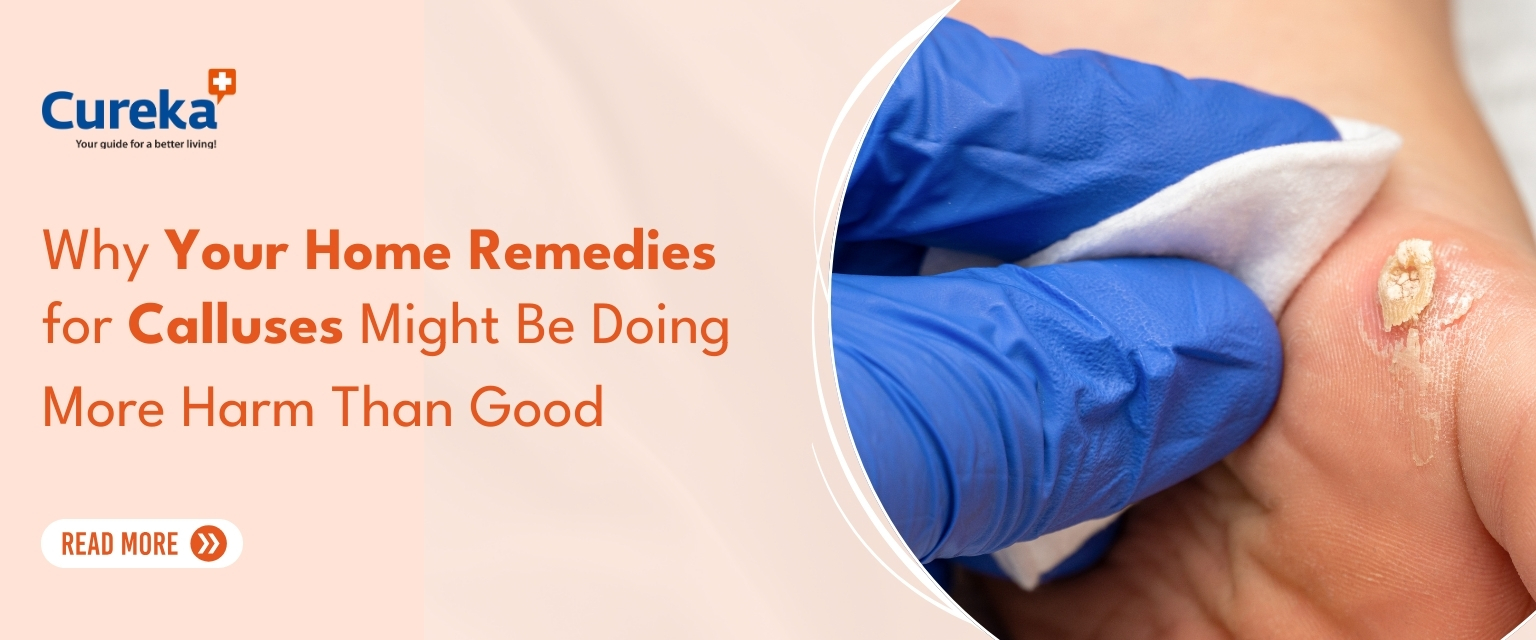Why Your Home Remedies for Calluses Might Be Doing More Harm Than Good
The Sandal Scandal: My Callus Tragedy
Last summer, I put on my sandals, only to see my heels in the mirror—rough, spotty, and alarming callus alert. In a mission to avoid a pedicure fee, I searched my kitchen for home remedies for calluses: a vinegar soak here, a pumice scrub there. After two weeks, my feet were red, raw, and angry as ever. My callus remover technique turned out to be a disaster. If you’ve been battling calluses with house repairs, you could be falling into the same trap. Let’s investigate why?
The Callus Conundrum: What’s Really Going On?
A callus is more than simply a cosmetic feature; it is your skin’s protective barrier against the pressure of friction and frequently forms on your feet as a result of tight shoes or lengthy periods of standing. While a foot callus remover appears to be a quick treatment, the home remedies you’re creating may be doing more damage than good. Here’s why your well-intentioned attempts may be harming your soles.
Myth vs. Reality: Busting Home Remedies for Calluses
Myth: Lemon juice helps to soften the calluses.
Reality: Particularly if you have cracked heels, the acid may sting more than it softens.
Myth: Scrubbing with baking soda is a natural way to get rid of calluses.
Reality: Too abrasive —rather than healing skin, it might tear it.
Despite their seeming cleverness, these tricks aren’t necessarily good for your feet.
Caution Zone : How Home Remedies for Callus Removers Backfire
Let’s examine the risk of practicing foot callus treatment at home:
1.Over-Exfoliation Disaster:
Using a pumice stone or hard skin remover on feet too vigorously might destroy healthy skin, leaving you with discomfort rather than smoothness. Excessive aggression will cause dead skin buildup in place.
2.Chemical Burns from Kitchen Mixtures:
A simple callus can become a terrible disaster if sensitive areas are irritated or burned by vinegar or aspirin pastes, which are common callus removers.
3.Infection Invitation
Using dirty instruments to cut calluses or soaking feet in unclean water? You’re giving bacteria a free pass, especially in areas that are already sensitive.
4.Worsening the Problem
When you focus on skin protection, harsh home remedies for calluses can cause skin to harden even more, making foot callus treatment much more difficult.
Home cures might save you money, but they could cost you comfort.
Smarter Solutions: Effective Foot Callus Treatment
So, how can you deal with a callus that won’t go away? This is a safer game plan:
Gentle Exfoliation
Replace harsh scrubs with a suitable hard skin remover for feet, such as a foot file applied sparingly after a warm soak.
Moisturize Like a Pro
To soften thick skin on feet without the burn of homemade acids, apply urea-based creams, which are made to treat foot calluses.
Store-Bought Saviors
Unlike the kitchen remedy, the quality callus remover (like salicylic acid pads) stops dead skin buildup accurately.
Pro Help for Stubborn Spots:
A podiatrist can securely shave your callus without the need for scissors
A Day in the Life: Before and After Callus Care
In the past, when I was trying to pull on socks, my callus caught on the fabric, and my feet were rough and dry. My heels softened in a matter of days after I stopped using vinegar and got a real foot callus remover. No more hiding my feet in shame—just smooth steps ahead.
Final note: Rethink your callus strategy.
Your calluses need a smart plan, not a hero. Home remedies for calluses are dangerous and could make your feet worse, even though they seem easy. Use tried-and-true callus removers or professional foot callus treatment to avoid taking a chance. You deserve better than a failed culinary attempt for your soles. Are you ready to leave the harm behind and enter a state of relief? Give up hacking and walk confidently.
References:
- Foot callus thickness does not trade off protection for tactile sensitivity during walking – Jun 2019 – https://pubmed.ncbi.nlm.nih.gov/31243365/
- Factors Associated with the Local Increase of Skin Temperature, ‘Hotspot,’ of Callus in Diabetic Foot: A Cross-Sectional Study. – May 2021 – https://pubmed.ncbi.nlm.nih.gov/34013766/.
- The effect of regular callus removal on foot pressures – Aug 1999- https://www.sciencedirect.com/science/article/abs/pii/S1067251699800660











